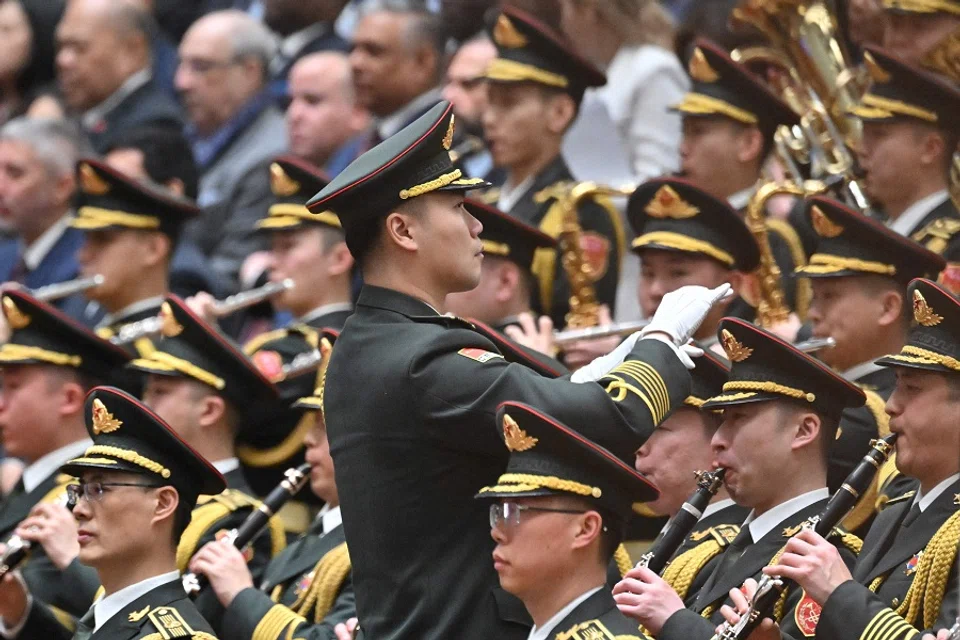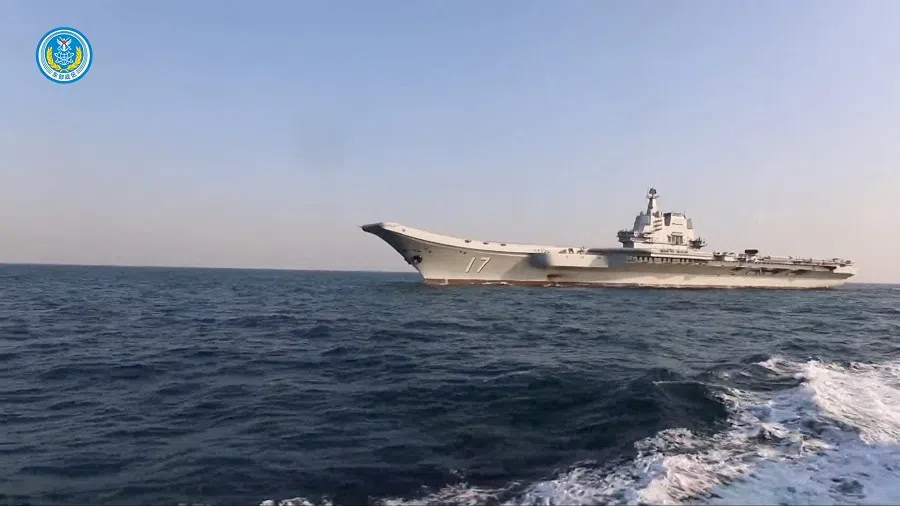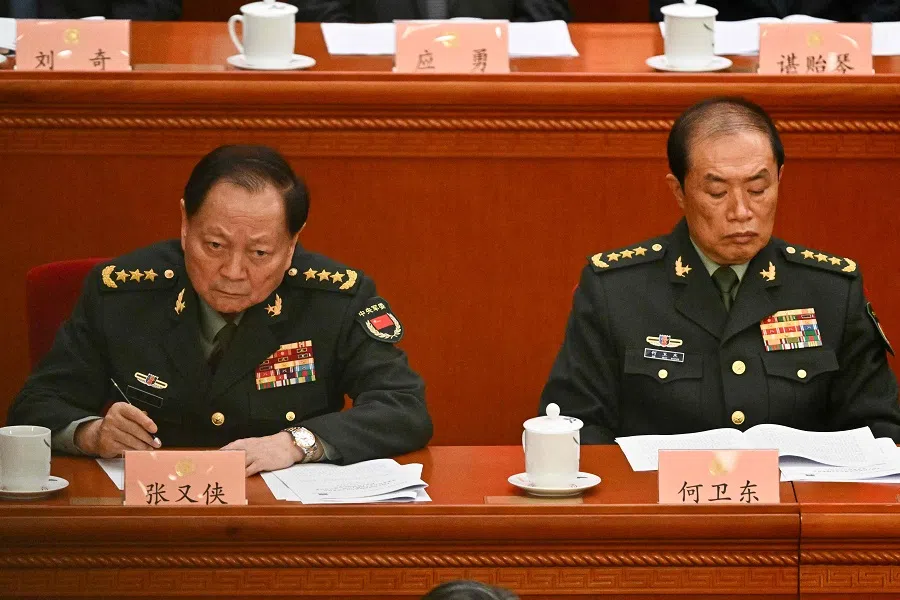Xi’s purge: Can a divided army fight?
The absence of CMC Vice-Chairman He Weidong raises questions on the stability of the Chinese PLA. As Beijing continues to emphasise “actual” combat preparedness and turn the heat on Taiwan, there is little scope for a military that cannot win a conflict it promises to, says Indian researcher Anushka Saxena.

On 22 April 2025, Chinese Central Military Commission (CMC) Vice-Chairman Zhang Youxia and Defence Minister Dong Jun hosted Indonesia’s Defence Minister Sjafrie Sjamsoeddin in Beijing. This is the latest leg in China’s continuing victory lap diplomacy with Southeast Asian nations over the past few weeks. But what is more fascinating about the defence talks, is the glaring absence of the CMC’s second vice-chairman, He Weidong.
And He’s absence is not just limited to this meeting. He has been missing from the public eye since 10 March, when he spoke at the National People’s Congress military and police plenaries. Particularly, his absence from two recent events — a voluntary annual tree-planting activity on 2 April (which all CMC members are expected to be part of), and the Central Conference on Work Related to Neighboring Countries in Beijing on 8-9 April — is notable.
China’s military ecosystem is witnessing an intense shake-up at the very top. While there exists a long list of purged and investigated Chinese armed forces officials from the past few years, He Weidong’s case is the most high-profile. It is likely that for now, he has been suspended while an investigation is underway, and may return to the public eye later.
But if not, this would indicate the fall of the third-in-command of the Asian power’s defence apparatus, making He the first CMC vice-chairman to be suspended and/ or purged in office for political reasons since Marshal He Long in 1966-67.
These are officials who will have a substantive role to play in Beijing’s Taiwan plans, have great knowledge of and power over China’s maritime power projection strategies in the Strait, and who are not-so-coincidentally also the latest targets of the churn in the CMC and PLA.
A domino effect underway
Because of a lack of official confirmation, the reason for He Weidong’s disappearance remains uncertain. But precedent dictates there is a domino effect underway — one where political opposition to officials with connected backgrounds may potentially be focused on revealing skeletons in the latter’s closets. This would lead to the dismantling of patron-client relationships, which China’s Marxist-Leninist system works on.
In He Weidong’s case, it is vital to look at those purged, suspended or rumoured to be under investigation before him. These include Miao Hua, head of the Political Affairs Department of the CMC; Lin Xiangyang, commander of the PLA Eastern Theater Command; Wang Xiubin, former commander of the Southern Theater Command; and Dong Jun, minister of national defence.
They have all had overlapping tenures in naval theatres — more specifically, the pre-reform 31st Group Army (now the 73rd Group Army) and the East Sea Fleet based out of Xiamen, Fujian. Both Wang and Lin are former deputy commanders of the 31st GA. Dong was deputy commander of the Eastern fleet when Wang was a leader of the 31st GA.

‘Fujian clique’ and the Taiwan Strait
Most importantly, it is no secret that Chinese President Xi Jinping has cultivated his protégé network by virtue of his long tenure in Fujian from 1985-2002. That is also when He Weidong and Miao Hua’s tenures overlapped with that of Xi, when they were respectively serving as the 31st GA’s chief of staff and Political Department director.
Subsequently, He and Miao nurtured their own influence with the next generation of Fujian officials, and today, it is manifesting in the form of a “Fujian clique” within the military. These are officials who will have a substantive role to play in Beijing’s Taiwan plans, have great knowledge of and power over China’s maritime power projection strategies in the Strait, and who are not-so-coincidentally also the latest targets of the churn in the CMC and PLA.
Partially, it could be because of the discovery of inefficiencies and corruption in the network, which undermined the cause of reunification and sabotaged combat preparedness vis-à-vis Taiwan and the US.
One can speculate why the dismantling of this Fujian clique is underway. Partially, it could be because of the discovery of inefficiencies and corruption in the network, which undermined the cause of reunification and sabotaged combat preparedness vis-à-vis Taiwan and the US. It could also be because the clique is pitted against the presence of another, a strong “Shaanxi gang” in the CMC, led by First Vice-Chairman Zhang Youxia.
Shaanxi gang and power struggles
Among the figures associated with Zhang’s so-called Shaanxi gang, Zhang Shengmin — currently a member of the CMC and head of its Discipline Inspection body (CCDI) — stands out prominently. A native of Shaanxi, Zhang spent much of his career in the pre-2015 Second Artillery Force, now known as the Rocket Force, before taking over as secretary of the CMC CCDI in 2017. Notably, his long-favoured Rocket Force has recently undergone significant upheaval, with former top commanders like Li Yuchao and Xu Zhongbo being charged last year with corruption and serious disciplinary violations.
Both the Zhangs also have a shared history of working with the PLA Army. It is no surprise that, as the CMC’s anti-corruption czar, Zhang Shengmin would act as a hammer Zhang Youxia may have no trouble wielding — including against CMC CCDI deputy secretary Tang Yong. Tang also had overlapping tenures with Miao and He in the Nanjing Military Region legal system in Fujian, and was stripped of his Chinese People’s Political Consultative Conference (CPPCC) membership on 26 March this year.
Subsequently, the defence minister’s position has seen a downgrade too, and the decision to disallow his CMC membership and state councilorship could have been a compromise struck between the factional opposites.

Adding to the potential motives for vendetta, is the purge of Li Shangfu, Dong Jun’s predecessor. He was a close confidante of Zhang Youxia, and his removal must have been quite a setback. Further, another Zhang aide, Liu Zhenli (currently head of the CMC Joint Staff Department and, like Zhang, a career army officer), was rumoured to replace Li as defence minister in late 2023.
That role, however, was given to Dong Jun, potentially on the recommendation of CMC seniors with the Fujian connection. Subsequently, the defence minister’s position has seen a downgrade too, and the decision to disallow his CMC membership and state councilorship could have been a compromise struck between the factional opposites.
Implications for war planning
Significant infighting in Xi Jinping’s close personal circle has obvious implications for war planning. As Beijing continues to emphasise “actual” combat preparedness and turn the heat on Taiwan, and as its contestation with Washington intensifies, there is little scope for a military that cannot win a conflict it promises to.
While the removal of corrupt and disloyal leading officials may lead to the appointment of better, thoroughly vetted ones, the trust deficit created is hard to bridge, impeding smooth functioning.
While the removal of corrupt and disloyal leading officials may lead to the appointment of better, thoroughly vetted ones, the trust deficit created is hard to bridge, impeding smooth functioning. The remnants of factionalism may also hinder jointness and interoperability between the four services at a time when there is a clear ground force-naval divide between top leadership. It also remains to be seen if the grassroots can continue unhindered in their affairs, even as the upper echelons of military management are in flux.
As to who could replace He Weidong and Miao Hua, it remains to be seen. As it is, the CMC itself used to be bigger than the six-member organisation it became in 2022 — the pre-2015-reform CMC had 11-15 members as well. Today, it seems to be operating on lean strength.
But it is likely that if Zhang Youxia is indeed ripping through Xi’s Fujian clique, Zhang Shengmin or Liu Zhenli could be recommended for the CMC vice-chairman position, and He Hongjun, executive deputy director of the CMC Political Affairs Department (also a Shaanxi-born), could also be promoted to director.
In any case, the coming months will reveal whether the current shake-up is a purge for performance or politics — and whether Xi’s military, built on personal loyalties and a harsh anti-corruption campaign, can endure without fracturing under the weight of its own factions.





